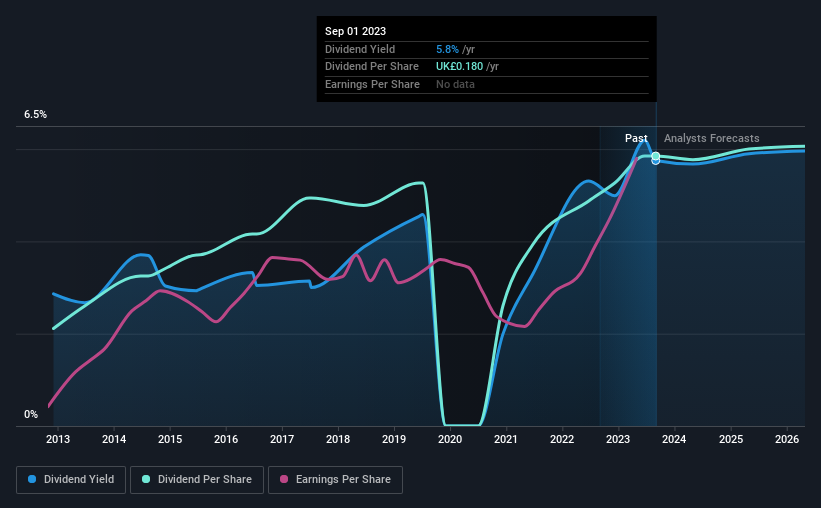Stock Analysis

Regular readers will know that we love our dividends at Simply Wall St, which is why it's exciting to see DS Smith Plc (LON:SMDS) is about to trade ex-dividend in the next four days. The ex-dividend date is usually set to be one business day before the record date which is the cut-off date on which you must be present on the company's books as a shareholder in order to receive the dividend. The ex-dividend date is of consequence because whenever a stock is bought or sold, the trade takes at least two business day to settle. Meaning, you will need to purchase DS Smith's shares before the 7th of September to receive the dividend, which will be paid on the 3rd of October.
The company's next dividend payment will be UK£0.12 per share. Last year, in total, the company distributed UK£0.18 to shareholders. Calculating the last year's worth of payments shows that DS Smith has a trailing yield of 5.8% on the current share price of £3.129. We love seeing companies pay a dividend, but it's also important to be sure that laying the golden eggs isn't going to kill our golden goose! As a result, readers should always check whether DS Smith has been able to grow its dividends, or if the dividend might be cut.
Check out our latest analysis for DS Smith
Dividends are typically paid from company earnings. If a company pays more in dividends than it earned in profit, then the dividend could be unsustainable. DS Smith paid out more than half (50%) of its earnings last year, which is a regular payout ratio for most companies. Yet cash flows are even more important than profits for assessing a dividend, so we need to see if the company generated enough cash to pay its distribution. The company paid out 90% of its free cash flow over the last year, which we think is outside the ideal range for most businesses. Cash flows are usually much more volatile than earnings, so this could be a temporary effect - but we'd generally want to look more closely here.
DS Smith paid out less in dividends than it reported in profits, but unfortunately it didn't generate enough cash to cover the dividend. Cash is king, as they say, and were DS Smith to repeatedly pay dividends that aren't well covered by cashflow, we would consider this a warning sign.
Click here to see the company's payout ratio, plus analyst estimates of its future dividends.

Have Earnings And Dividends Been Growing?
Businesses with strong growth prospects usually make the best dividend payers, because it's easier to grow dividends when earnings per share are improving. If earnings decline and the company is forced to cut its dividend, investors could watch the value of their investment go up in smoke. This is why it's a relief to see DS Smith earnings per share are up 9.4% per annum over the last five years. Earnings have been growing at a steady rate, but we're concerned dividend payments consumed most of the company's cash flow over the past year.
Many investors will assess a company's dividend performance by evaluating how much the dividend payments have changed over time. Since the start of our data, 10 years ago, DS Smith has lifted its dividend by approximately 11% a year on average. We're glad to see dividends rising alongside earnings over a number of years, which may be a sign the company intends to share the growth with shareholders.
The Bottom Line
From a dividend perspective, should investors buy or avoid DS Smith? Earnings per share have grown somewhat, although DS Smith paid out over half its profits and the dividend was not well covered by free cash flow. With the way things are shaping up from a dividend perspective, we'd be inclined to steer clear of DS Smith.
With that being said, if you're still considering DS Smith as an investment, you'll find it beneficial to know what risks this stock is facing. For example, DS Smith has 2 warning signs (and 1 which makes us a bit uncomfortable) we think you should know about.
Generally, we wouldn't recommend just buying the first dividend stock you see. Here's a curated list of interesting stocks that are strong dividend payers.
Valuation is complex, but we're helping make it simple.
Find out whether DS Smith is potentially over or undervalued by checking out our comprehensive analysis, which includes fair value estimates, risks and warnings, dividends, insider transactions and financial health.
View the Free AnalysisHave feedback on this article? Concerned about the content? Get in touch with us directly. Alternatively, email editorial-team (at) simplywallst.com.
This article by Simply Wall St is general in nature. We provide commentary based on historical data and analyst forecasts only using an unbiased methodology and our articles are not intended to be financial advice. It does not constitute a recommendation to buy or sell any stock, and does not take account of your objectives, or your financial situation. We aim to bring you long-term focused analysis driven by fundamental data. Note that our analysis may not factor in the latest price-sensitive company announcements or qualitative material. Simply Wall St has no position in any stocks mentioned.
About LSE:SMDS
DS Smith
Provides packaging solutions, paper products, and recycling services worldwide.
Good value second-rate dividend payer.

